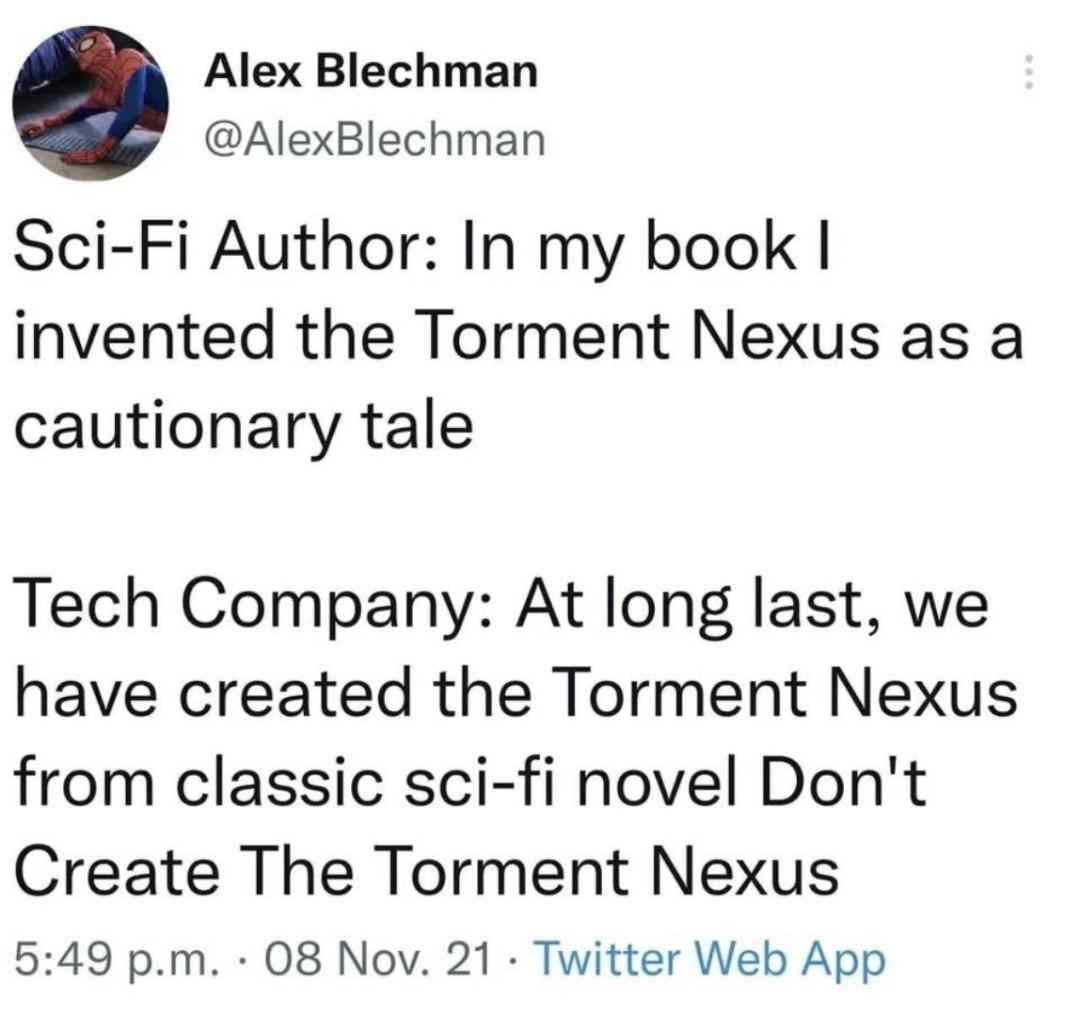this post was submitted on 22 Aug 2023
129 points (99.2% liked)
Programmer Humor
23427 readers
497 users here now
Welcome to Programmer Humor!
This is a place where you can post jokes, memes, humor, etc. related to programming!
For sharing awful code theres also Programming Horror.
Rules
- Keep content in english
- No advertisements
- Posts must be related to programming or programmer topics
founded 2 years ago
MODERATORS
you are viewing a single comment's thread
view the rest of the comments
view the rest of the comments

On the other other hand, maybe we only understand the dangers of the Torment Nexus and use it responsibly because science fiction authors warned techy people who are into that subject about how it could go wrong, and the people who grew up reading those books went out of their way to avoid those flaws. We do seem to have a lot more of the technologies that sci-fi didn't predict causing severe problems in our society.
But this is exactly contrary to my point, a science fiction author isn't qualified or motivated to give a realistic "understanding" of the Torment Nexus. His skillset is focused on writing stories and the stories he writes need to contain danger and conflict, so he's not necessarily going to interpret the idea of the Torment Nexus in a realistic way.
I think you don't understand what motivates a lot of science fiction authors. Sure, there are a lot of science fiction novels that are really just science themed fantasy, but there are also a lot of authors that love real science and are trying to make stories about realistic interpretations of its potential effects. To say that science fiction authors don't care about interpreting the Torment Nexus in a realistic way misses the entire point of a lot of really good science fiction.
So Isaac Asimov, Arthur C. Clarke, and Robert A. Heinlein aren't qualified to give understandings of the technologies they wrote about?
Nope. Isaac Asimov was a biochemist, why would he be particularly qualified to determine whether robots are safe? Arthur C. Clarke had a bachelor's degree in mathematics and physics, which technology was he an expert in? Heinlein got a bachelor of arts in engineering equivalent degree from the US Naval Academy, that's the closest yet to having an "understanding of technology." Which ones did he write about?
Those were a list of authors who were pretty good at getting the science in their sci fi right. They talked to scientists working on the fields they wrote about. They wrote "hard" sci fi
You cannot judge their competence by their formal education
Well, I also am "pretty good" at getting the science right when I write sci fi. Makes me just as qualified as them, I guess.
The problem remains that the overriding goal of a sci fi author remains selling sci fi books, which requires telling a gripping story. It's much easier to tell a gripping story when something has gone wrong and the heroes are faced with the fallout, rather than a story in which everything's going fine and the revolutionary new tech doesn't have any hidden downsides to cause them difficulties. Even when you're writing "hard" science fiction you need to do that.
And frankly, much of Asimov, Clarke and Heinlein's output was very far from being "hard" science fiction.
Holy shit, you don't know about the rise of interdisciplinary science in the 20th century, do you?
That generally involves training across multiple disciplines.
So you guys don't know then. Huh. 🤔